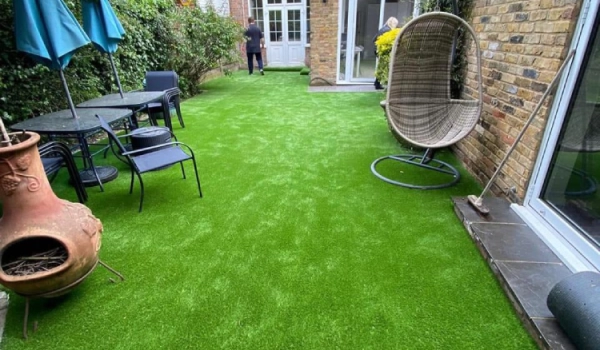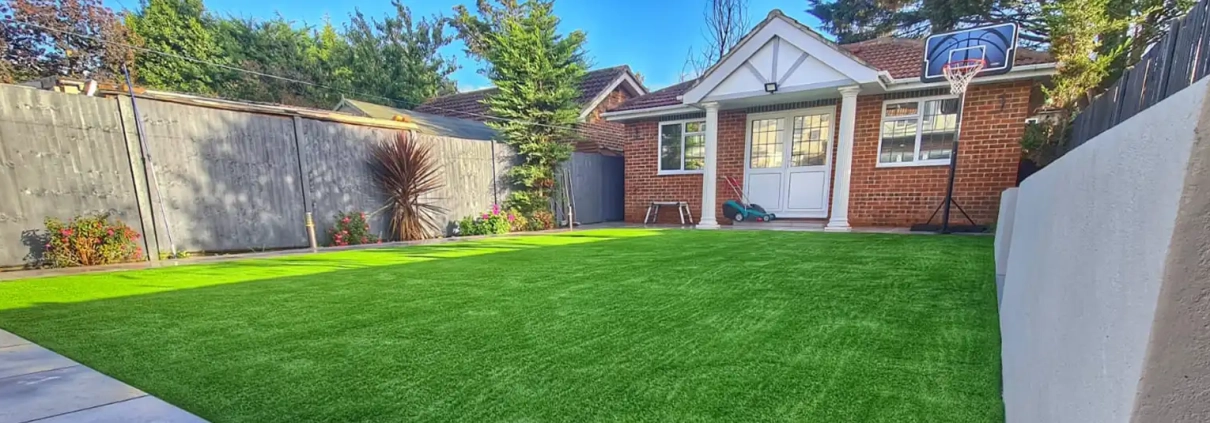DIY Artificial Grass – A Step-by-Step Guide
in Uncategorized/by Gabriel MooreDIY Artificial Grass – A Step-by-Step Guide
7-MINUTE READ
Tired of mowing, watering, and dealing with patchy grass every summer?
I get it — you’re not alone. A lot of you have been there, frustrated with the endless upkeep of natural lawns.
That’s why more and more homeowners are making the switch to DIY artificial grass. It’s low-maintenance, looks great all year round, and gives you more time to actually enjoy your outdoor space.

Estimate Quote
Fill in your details and get a price now
And here’s the best part:
You can absolutely install turf yourself.
Now, I won’t sugar-coat it,
Going the DIY route takes some planning and a bit of technical know-how. From properly prepping the ground to joining the turf without visible seams, there’s more to it than just unrolling a green carpet.
That’s exactly why I’ve put together this straightforward, 7 simple, step-by-step guide to help you get it right the first time.
Whether you’re laying artificial grass in your back garden, on a rooftop, or even on a small balcony, I’ll walk you through everything you need to know to make it work.
Let’s dive in and get your space looking sharp.
Get Your Tools & Materials Ready
Before you start your DIY synthetic grass project, gather everything you’ll need. Trust us — running back and forth to the store mid-project is no fun.
Tools You'll Need:
- Sharp utility knife (with extra blades)
- Tape measure
- Notched trowel or glue spreader
- Broom or stiff brush
- Heavy objects or a weighted roller
- Gloves and knee pads
Materials:
- DIY fake grass or artificial turf
- Weed membrane
- Joining tape
- Adhesive (either one-part or two-part depending on the area size)
- Optional: Silica sand or infill for added stability
Pro Tip: Always check that your artificial grass pieces are the same pile height and colour. Mismatched turf is a rookie mistake.
Prep the Area Like a Pro
Just like painting a wall, the prep work makes all the difference.
- Remove any grass, debris, stones, or roots from the area.
- Lay a solid sub-base (MOT Type 1 or granite dust) to ensure a flat, well-draining surface.
- Compact the base using a wacker plate — this gives your turf a stable foundation.
- Roll out a weed membrane to stop pesky plants from poking through later.
This is the boring bit, sure. But skipping this step will lead to bumpy, uneven turf that looks — and feels — amateur.
Roll Out & Acclimate Your Turf
Unroll your DIY artificial turf and let it sit for a few hours (or overnight if possible). This allows the material to relax and flatten out, making it easier to work with.
Here’s where it gets really important: Make sure all your turf pieces are facing the same direction. The grass blades have a grain, and mismatched directions will make joins glaringly obvious.
Trim the Edges
Grab your utility knife and carefully trim the edges of the turf. You want to cut about 2-3 stitch lines in from the edge to remove the factory edge (called the “selvage”).
Then, line the pieces up edge to edge — not overlapping, not gapped. Just perfectly snug, like a puzzle piece.
This is one of the most crucial parts of joining artificial grass. Take your time here. If done right, the seam should be nearly invisible.
Apply Joining Tape & Adhesive
Now it’s time to use artificial grass like a pro.
- Lay your joining tape under the seam, shiny side down.
- Apply adhesive in a zig-zag pattern using your notched trowel.
- Slowly fold both turf edges down onto the tape.
- Press firmly along the seam and weigh it down using heavy objects or a roller.
Let the adhesive cure — usually for about 24 hours. Don’t rush this step; it’s the difference between a long-lasting join and one that peels apart in a week.
Whether it’s your first time or you’ve tackled DIY turf installation before, this part is where many DIYers trip up. Go slow and stay aligned.
Brush It Up & Add Infill (Optional)
After the adhesive sets, give your new lawn a good brushing. Use a stiff broom and brush against the grain — this fluffs up the fibres and helps disguise the seams.
If you’re using DIY synthetic grass that requires infill, now’s the time to spread it evenly across the turf. Silica sand is a popular choice and helps weigh the turf down, keeping it secure.
Feeling Tired Already? Call the Astro Experts
You’ve measured, cut, joined, glued… and maybe cursed a little along the way. Let’s face it — while DIY turf installation can be a satisfying challenge, it’s also a lot more work than it looks on YouTube.
If you’re starting to wonder whether your weekend plans just turned into a week-long turf marathon, don’t stress. That’s exactly why we’re here.
At AstroLondon, we’ve helped countless homeowners who began their artificial grass journey with big plans (and sore backs) and decided to let the experts take over. From prepping the ground to those tricky joins, we handle it all so you don’t have to.
Explore our installation process here: Astro Artificial Grass Installation
Skip the struggle — let Astrocare bring your garden to life while you sit back and relax.
Request a FREE Survey and Quote
Final Thoughts
If you’re up for the challenge, DIY artificial grass installation is a great way to save some money and take pride in transforming your own space.
But let’s be real — installing artificial grass isn’t just about laying turf. It’s about adding lasting beauty, comfort, and value to your home. And when something’s meant to enhance your lifestyle, it deserves expert guidance.
Whether it’s getting the joins seamless, ensuring proper drainage, or just saving yourself hours of trial and error — sometimes the best DIY decision… is knowing when to call in the pros.
Let the Astro Experts help you get that perfect finish — the first time around.
Estimate Quote
Fill in your details and get a price nowTL;DR
- Gather your tools and materials
- Prep the area with a solid sub-base
- Unroll and align your turf
- Trim the edges precisely
- Join the turf with tape and adhesive
- Brush and infill for a natural look
- Call the experts if it gets overwhelming
FAQs
Can I install turf myself?
Yes! With the right tools and patience, DIY turf is achievable. But seams and joins require care and precision.
How do I hide seams when joining artificial grass?
Trim edges cleanly, match the pile direction, and use quality tape and adhesive. Brush up the fibres after joining to blend the seam.
Do I need infill for my DIY artificial turf?
Not always, but infill helps with stability, drainage, and a more natural feel underfoot.












